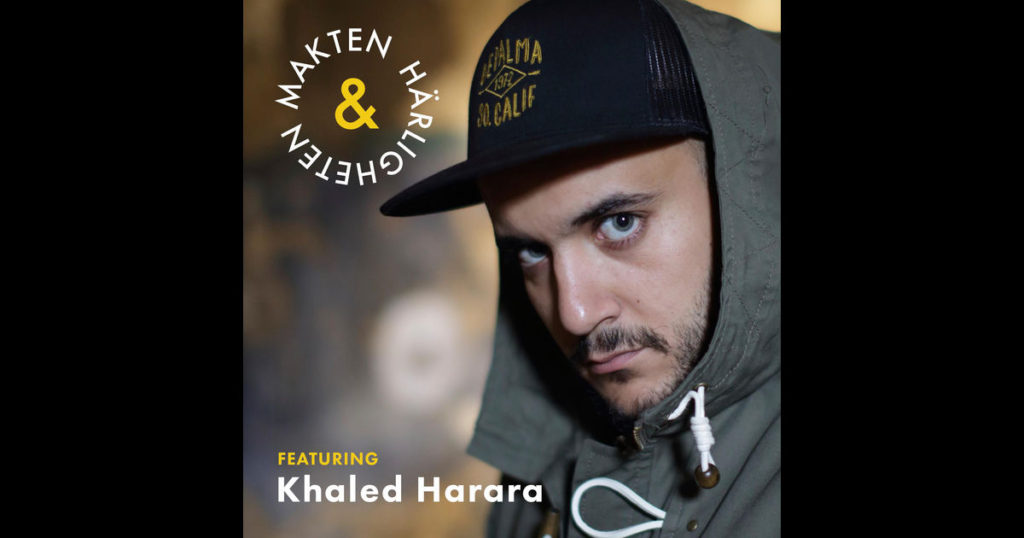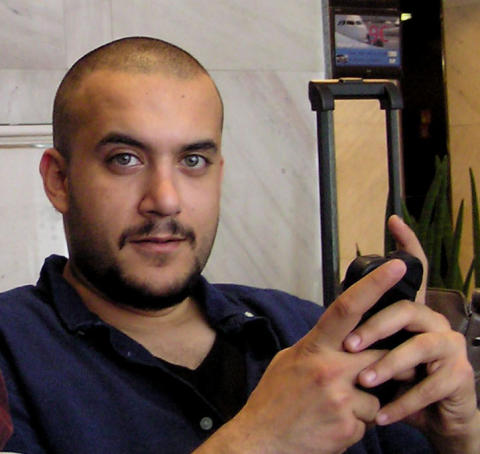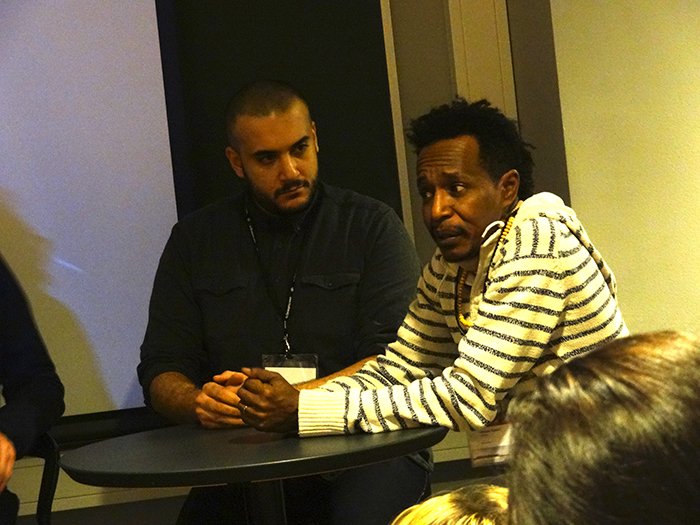Khaled Bashir Fouad Harara
Musician
Khaled Harara is a young rapper from Gaza City. Khalid likes to say Gaza City is located in the Holy Land. Some say it is part of Palestine. Others say it is in the Occupied Territories. Today Khaled lives in Gothenburg, Sweden far from the ongoing conflict affecting so many people in his homeland.

He was born in Yemen in 1987 while his parents, both educated professionals, were living away from the devastation in Palestine since the 1964 war. With the Oslo Peace Accords in 1994, young Khaled and his family moved back to Gaza City. This was a time Khaled calls the best time to live in Gaza City. However, as the peace process fell apart, Khaled became unhappier with the situation he faced on a day-to-day basis. This included bombings, lack of electricity, lack of water, and war—seemingly occurring every two years. He turned to rap music, musing about the unfairness of the situation that he and his people had to face— nearly constant attacks from the Israeli military.
Under the Oslo Accords, generally, Israel recognized the Palestine Liberation Organization (PLO) as being representative of the Palestinian people; the PLO recognized the state of Israel; and, the Palestinian Authority (PA) was established to provide limited self-governance over Palestine—The West Bank and The Gaza Strip. The signing of the agreement was intended under the Mideast peace process to move towards the fulfillment of the “right of the Palestinian people to self-determination.” In 2000, after a number of provocations, renewed violence between Palestine and Israel broke out—this was called the Second Intifada. It has continued, more or less, since then. In 2007, Hamas took control of the Gaza Strip, including Gaza City, leaving Fatah in control of the PA controlled parts of the West Bank. Israel has maintained a number of security measures on the Gaza Strip since then, particularly border closures, which has degraded economic conditions. Palestinians in Gaza have little access to water and electricity. Income per capita in all of PA-controlled areas was $2,900 – making it one of the poorest on the planet.
As the peace process fell apart, Khaled took to rapping. His lyrics focused on the Israeli occupation. He is quick to point out that his frustrations and anger were with the Israeli Government, not the people. Still, he cannot understand how good people could vote for politicians who cause all this hardship and suffering.
Khaled joined the Palestinian Army in 2006 with help from his father’s contacts. While serving in the army, he became even more disillusioned, not with the Israeli occupation, but with the Hamas and Fatah governments. He wondered why he should work for a mere pittance—a few hundred dollars a month—to risk his life for a government he increasingly saw as being corrupt. He came to believe that the Hamas government can only exist while Palestine is under Israeli occupation. That they have a vested interest in maintaining the status quo, regardless of the needs of the people. After Hamas took over the government in Gaza in 2007, all soldiers in the army, including Khaled, were replaced with Hamas soldiers. Having worked for the Fatah regime, Khaled and his parents, both doctors, found themselves out of work and living in a deplorable situation.
In 2009, he was arrested after a UN sponsored performance. He was driven around Gaza by three soldiers. He was interrogated. His cell phone and laptop were searched. He was eventually released, but during the incident he feared he would be made a “fear example” – beaten up and left in a garbage dumpster. He wondered whether his music was worth this suffering and decided it was. This experience had changed his life. Yet he feared the effect on his family if he “disappeared”.

Khaled was able to leave Gaza in 2013—not an easy thing to do. Emigration from Palestine is tightly controlled, by Hamas and Israel. Thanks to the Swedish offer to provide him residency, he eventually settled in Gothenburg where he lives today. He yearns to return to his homeland, but knows if he does, he will not be able to leave again. His passion for Gaza has grown during this self-imposed exile. His main focus now is to educate himself so that one day he can return to Gaza and give something back to the people there. Khaled said, “When I do go back I need to have something between my hands for myself and for my people there.”
In the meantime, in collaboration with The Rickseatern in Sweden, Khaled has started an educational program for Gazans to teach them about music: performing, music theory, and sound recording. He hopes to expand the program into government run schools, effectively partnering with the Hamas Government. In Global Week’s feature article about his endeavors, Khaled explained that “music has made me a better human being”.
Khaled sees a direct comparison between the Jüdische Kulturbund and the situation in Gaza. He understands the compulsion for self-expression is accentuated under tyranny. As a young man he felt compelled to write songs and sing because of the frustrations of living in a conflict zone. It helped him to cope with a world he believes is “crazy”. There are other parallels as well, particularly the government collaborations with artists suppressed by that same government. Finally, his mother, as a young medical student studying in Germany visited the remnants of a Nazi death camp and sensed the smell of death. The visit had a profound effect on his mother, who suffered injuries earlier in life while living in Lebanon during the war there. Still, Khaled cannot understand why the children and grandchildren of Nazi’s victims are perpetrating similar atrocities in Palestine.
Despite his experiences, Khaled remains hopeful that the situation can be improved. Recalling that Palestinian cab drivers sometimes listen to Israeli music and Israelis listen to Palestinian music on the radio, he believes music forms a perfect bridge to bring people together. He yearns to visit Israel, but this is virtually impossible at this time. Such a visit, he states, “would not be for political reasons, but for pure understanding and for discovering the missing parts in the relationship between neighbors and human beings, all who belong to the Holy Land.”

Since moving to Sweden, Khaled’s music reputation has grown. He writes songs about the oppressive conditions for those living in Gaza City and the effects for him being far away from his homeland. His song Hatlaiha (You Will Find it) describes life as an emigre, the struggles he faces within, and his determination to follow his heart. He travels around Scandinavia performing solo concerts as well as performs with bands. Khaled also records, solo and in collaboration with other musicians, songs that are available on iTunes, Soundcloud and Spotify, including Hatlaiha (Find It) and Elhoria (Freedom), The Age of Silence: Refugees of Rap, and the song Kofta Bs-Seneyeh. At age 29, Khaled has achieved so much already. He has committed his life’s work to building a bridge to freedom for the Palestinians and Jews through his music.

Most recently Khaled participated in the Music Freedom Day Harstad 2015 Concert and Network conference in Norway where he and Sudanese musician Abazar Hamid spoke (above) about their experiences as persecuted musicians. Each year, the conference recognizes March 3 as Music Freedom Day, celebrating artistic freedom “in solidarity and support for persecuted and endangered musical artists worldwide.
